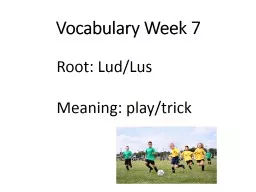PPT-Vocabulary Making New Words Your Own
Author : celsa-spraggs | Published Date : 2018-03-09
why Bother Vocabulary sharpens your communication Choosing words with greater precision Understanding words you already know Making communication simpler Why Bother
Presentation Embed Code
Download Presentation
Download Presentation The PPT/PDF document "Vocabulary Making New Words Your Own" is the property of its rightful owner. Permission is granted to download and print the materials on this website for personal, non-commercial use only, and to display it on your personal computer provided you do not modify the materials and that you retain all copyright notices contained in the materials. By downloading content from our website, you accept the terms of this agreement.
Vocabulary Making New Words Your Own: Transcript
Download Rules Of Document
"Vocabulary Making New Words Your Own"The content belongs to its owner. You may download and print it for personal use, without modification, and keep all copyright notices. By downloading, you agree to these terms.
Related Documents














